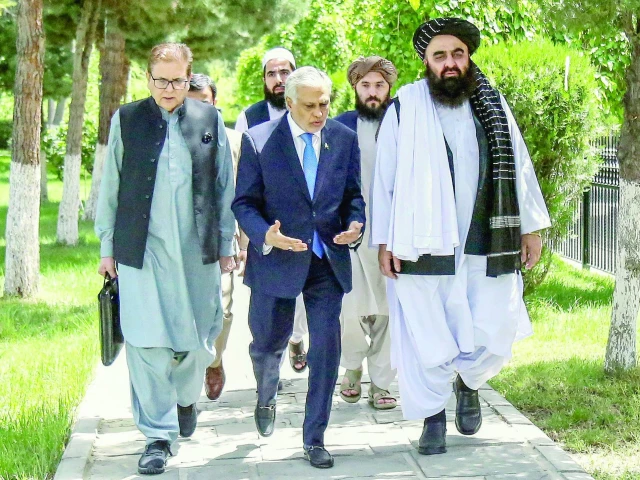Islamabad, Kabul eye joint fix for TTP
Joint panel to address terrorism, border issues; Dar assures no forced repatriations of refugees

Amid reservations expressed by the Afghan Taliban government over Islamabad's ongoing deportation of undocumented Afghan nationals, both sides on Saturday agreed to ensure a dignified and orderly repatriation process.
The tentative breakthrough came during Deputy Prime Minister and Foreign Minister Ishaq Dar's day-long visit to Kabul – his first since assuming office – to defuse tensions and revive stalled security cooperation.
Dar held wide-ranging talks with Acting Afghan Foreign Minister Amir Khan Muttaqi. The discussions covered the full spectrum of bilateral relations, with a strong focus on restoring trust and revamping coordination, particularly in the areas of security, trade, transit and regional connectivity.
Highlighting Pakistan's concerns, Dar said that addressing cross-border security and managing the porous frontier was crucial to unlocking the potential of regional economic integration.
Both sides reaffirmed their resolve to keep the diplomatic channels open and continue high-level exchanges to navigate shared challenges.
In a promising thaw to months of diplomatic freeze, Pakistan and Afghanistan have agreed to tackle the thorny issue of the outlawed Tehreek-e-Taliban Pakistan (TTP) through mutual understanding and joint mechanisms, a senior source confirmed.
The two neighbours have agreed to establish a joint committee – comprising intelligence officials, interior ministry representatives, and staff from Pakistan's embassy in Kabul – to engage directly with Afghan counterparts on counterterrorism and border management, amid a surge in cross-border militancy that has rattled Pakistan, particularly Balochistan and Khyber Pakhtunkhwa.
Later, Dar also met with Acting Afghan Prime Minister Mullah Muhammad Hassan Akhund, where the emphasis remained on confidence-building measures to mend frayed ties and open new avenues of cooperation.
Both sides exchanged views on key issues of mutual interest, including security, trade and transit cooperation, and explored ways to enhance people-to-people contacts.
Reaffirming the commitment to continued engagement, both sides agreed to maintain high-level exchanges to further strengthen the relations between the two brotherly countries.
In another important meeting, Dar met with Acting Afghan Deputy Prime Minister Mullah Abdul Salam Hanafi. The two leaders deliberated on all issues of mutual interest, including peace and security, economic cooperation, and regional connectivity projects.
They agreed to strengthen bilateral trade, transit, and economic engagement for the mutual benefit of both peoples and to remain engaged to realise the full potential of regional development, including through trans-regional connectivity projects.
Pakistan's high-level delegation held three key meetings during the visit. One session with the Afghan foreign minister focused on the repatriation of Afghan refugees, their rights, the protection of properties and a phase-wise return strategy under mutually agreed frameworks.
In a second meeting with Maulvi Hassan Akhund, security matters, including Islamabad's concerns regarding the TTP and the rising incidents along the Pakistan-Afghanistan border and settled districts, were discussed in detail.
The third meeting with Maulvi Muhammad Khalid Hanafi centred on economic issues, including progress on the CASA-1000 MW electricity project, Central Asia-Pakistan railway connectivity via Kohat and Parachinar, transit trade facilitation and tariff reductions on import-export items between the two countries.
Pakistan also assured that no Afghan refugee would be forcibly repatriated.
Afghan concerns over deportation
Meanwhile, a statement issued by the Afghan side quoted Muttaqi expressing "his deep concern and regret over the situation of Afghan refugees in Pakistan and their forced deportation" during his talks with FM Dar.
The Afghan foreign ministry urged Pakistani authorities to prevent what it called "the erosion of the rights of Afghans living there and those coming there."
Muttaqi also expressed eagerness to expand trade, transit, and joint projects with Pakistan and reminded the visiting delegation that "concrete steps should be taken to resolve problems and create facilities in these areas".
FM Dar, in turn, invited the Afghan diplomat to visit Pakistan for a follow-up official visit.
According to the Afghan statement, Dar noted that to enhance bilateral trade, Pakistan had already reduced tariffs on a large number of trade goods and pledged to take effective measures in facilitating the transportation of commercial items.
He also reiterated Pakistan's determination to expand trade and transit ties, promising necessary support in these areas.
Regarding Afghan refugees, Dar assured that "they would not be mistreated" and that Pakistan would take "serious steps" to ensure their safety.
He reaffirmed that the property and capital of Afghan refugees remained theirs, adding that "no one could seize their goods." The statement also mentioned that Dar pledged Pakistan's security forces would prevent any "arbitrary action" in this regard.
"The meeting discussed issues such as enhancing diplomatic relations, coordination, joint cooperation, increasing and facilitating visas, rapid transportation of agricultural products, promoting trade and transit, and the importance, ongoing process, and special attention to a number of major projects such as Afghan Trans rail line, CASA-1000, TAPI, and TAP," the Afghan statement added.
At the conclusion of the Pakistani delegation's visit to Kabul, Muttaqi expressed hope in a joint press conference with his Pakistani counterpart that if both sides implement the agreements and discussions held, it would benefit both countries.
He said, "We hope that today's meetings, if followed by practical action and sincere implementation of the decisions made, will greatly contribute to the fields of economy, politics, connectivity, and other areas."
Dar said the two sides had agreed to resolve existing economic challenges between the two nations.
"Four key decisions have been made regarding migrants. First, the return of migrants will be carried out with dignity and respect. I believe this is our moral, religious, and neighbourly duty, and it reflects our goodwill, as mandated by the government," Dar shared.
However, if complaints arise in any area, the interior minister is instructed to address them, he added.
At the end of the talks, both sides agreed to form joint committees to follow up on these matters and identify effective solutions to bilateral challenges.


















COMMENTS
Comments are moderated and generally will be posted if they are on-topic and not abusive.
For more information, please see our Comments FAQ